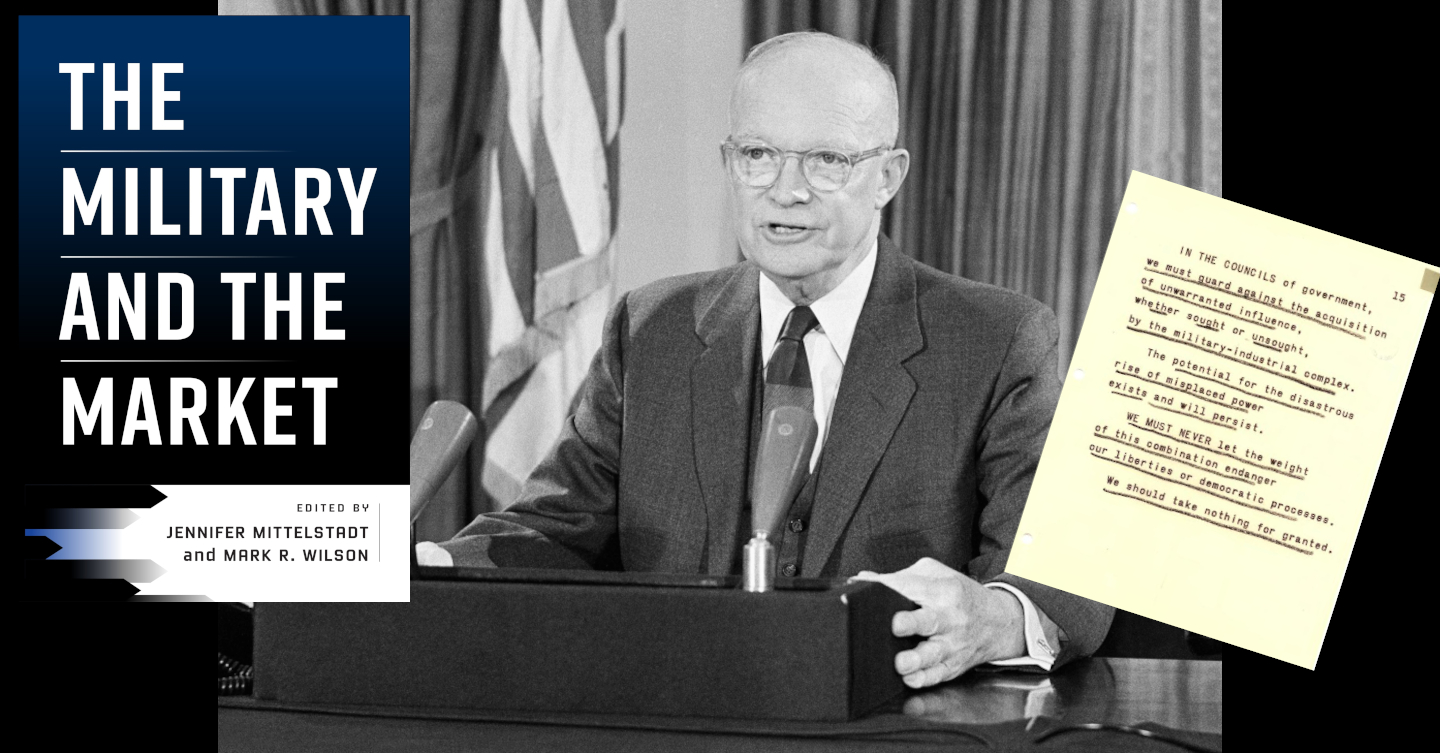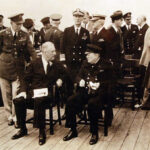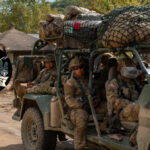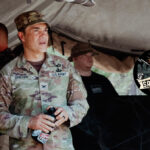
Since President Eisenhower first named and warned against the military-industrial complex in his farewell speech, the relationship between “the military and the market” has been the subject of heightened scrutiny from Congress, the press, and scholars. A new book by that name provides new and surprising perspectives by taking the long view of two centuries of the economic dimensions of the military from entrepreneurs and new technologies to consumer products and sex workers. A BETTER PEACE welcomes editors and contributors Kara Dixon Vuic, Jennifer Mittelstadt and Mark R. Wilson as they discuss they discuss the good, the bad and the ugly of the military-industrial complex and beyond with podcast editor Ron Granieri.
What most people think when they think of the military and the market is kind of weapons and materiel contracting, maybe service contracting. So one of the things that the book wants to do is blow open our understandings and see that the military actually operates in dozens and dozens of different ways and different capacities.
Podcast: Download
Kara Dixon Vuic is the Lance Corporal Benjamin W. Schmidt Professor of War, Conflict, and Society in 20th-Century America at Texas Christian University.
Jennifer Mittelstadt is Professor of Political and Military History at Rutgers University and former Harold K. Johnson Chair of Military History at the U.S. Army War College.
Mark R. Wilson is a professor of history at the University of North Carolina at Charlotte. His research explores the history of U.S. war mobilizations, and the development of military-industrial relations, from the 19th century to the present day.
Ron Granieri is an Associate Professor of History at the U.S. Army War College and the Editor of A BETTER PEACE.
The views expressed in this presentation are those of the speakers and do not necessarily reflect those of the U.S. Army War College, U.S. Army, or Department of Defense.
Photo Description: Screen cap of President Dwight D. Eisenhower’s farewell address and the reading copy he marked up for use during the speech.
Photo Credit: Eisenhower Presidential Library and Museum website





The relationship between the military and the free market, this is that the military is prepared to stand hard — and/or actually does stand hard when necessary — against those “enemies” — foreign and domestic — that get in the free market’s way. Herein, the free market providing the U.S. — and our people — with the ability to attain “life, liberty and the pursuit of happiness?”
In this regard, consider the following from NSC-68:
a. From Section II: “Fundamental Purpose of the United States:”
“The fundamental purpose of the United States is laid down in the Preamble to the Constitution: ‘. . . to form a more perfect Union, establish justice, insure domestic Tranquility, provide for the common defense, promote the general Welfare, and secure the Blessings of Liberty to ourselves and our Posterity.”
(Note: It takes an a never-ending and ENORMOUS amount of money/revenue to provide for all these such requirements. Thus the military must take on such “enemies” — foreign and domestic — that get in the way of the “engine” — to wit: the free market — which provides these such funds?)
b. From Section IV: “The Underlying Conflict in the Realm of Ideas and Values Between the U.S. Purpose and the Kremlin Design;” therein, go to item “B,” “Objectives:”
“The objectives of a free society are determined by its fundamental values and by the necessity for maintaining the material environment in which they flourish.”
(Thus, anything or anyone [for example “cultural backwardness” problems found both here at home and there abroad, and/or a different philosophy/ideology such as communism] that get in the way of the free market — and thus get in the way of the U.S. “maintaining the material environment needed to provide that our fundamental values might flourish” — this is where the military, if necessary, will step in and take action to eliminate these such foes?)
Thus, to properly understand the fundamental nexus — the fundamental connection — between the military and the market?
Re: my thought above — as to the most basic/the most fundamental relationship between the military and the market — consider the following “maintain the conditions under which orderly development can take place” mission of the U.S. military; this, as found at our Joint Publication 3-22 Foreign Internal Defense; therein, see Chapter II, Internal Defense and Development, and Paragraph 2, Construct:
“a. An IDAD (Internal Defense and Development) program integrates security force and civilian actions into a coherent, comprehensive effort. Security force actions provide a level of internal security that permits and supports growth through balanced development. This development requires change to meet the needs of vulnerable groups of people. This change may, in turn, promote unrest in the society. The strategy, therefore, includes measures to maintain conditions under which orderly development can take place.” (Item in parenthesis above is mine.)
I must congratulate you on the fascinating podcast, this was a completely unexpected gem, as they so often are from the Warroom.
Thanks again for the great topics and insights.
Might we consider the relationship between the military and the market from the perspective of (a) those individuals who are responsible for our nation’s national security (the U.S.’s political, economic, and military elite?) — at least until recently — seeing very much eye-to-eye with regard to (a) the nature of the post-Cold War threat (economic competition — and what this might lead to) and (b) the need to support such things as diversity, equity and inclusion — so as to help address this such threat? In this regard, might we:
a. First consider how the post-Cold War threat was viewed/defined:
” … The chief thesis of this article is that the (U.S.) Supreme Court has embarked on a program of reshaping constitutional doctrine so as to encourage and facilitate the emergence of a fully developed Market State in this polity, with a view to positioning the United States to be successful in meeting the competitive challenges of a new, post-Cold War international order. … Proponents of this vision of a globalized economy characterize the United States as ‘a giant corporation locked in a fierce competitive struggle with other nations for economic survival,’ so that ‘the central task of the federal government’ is ‘to increase the international competitiveness of the American economy.”
(Item in parenthesis above is mine. See the only full paragraph on Page 643 of the Catholic University of America, Columbus School of Law paper “Moral Communities or a Market State: The Supreme Court’s Vision of Police Power in the Age of Globalization” by Antonio F. Perez and Robert J. Delahunty.) And:
b. Next, to look at how support of such things as diversity, equity and inclusion was viewed — as being essential to meeting this such threat:
“Major American businesses have made clear that the skills needed in today’s increasingly global marketplace can only be developed through exposure to widely diverse people, cultures, ideas, and viewpoints. What is more, high-ranking retired officers and civilian leaders of the United States military assert that, ‘based on their decades of experience’ a ‘highly qualified, racially diverse officer corps … is essential to to the military’s ability to fulfill its principle mission to provide national security. … ”
(Justice Sandra Day O’Connor being quoted here. See beginning at the bottom of Page 698 of the Catholic University of America, Columbus School of Law paper I reference above.)
Question:
With the military, the market and the (establishment) politicians all being on the same page here, did all of these ultimately become the enemy of those who would (a) lose power, influence and control; this, (b) via these such “provide for national security in the age of economic competition” efforts?
At approximately the 06.00 point in this podcast a question as to the overall theme of the book is asked. The answer given is that — in about half of the book — “this is the story of a U.S. military’s growing dependence upon and growing approval of market, business and private sector solutions to its needs.”
Accordingly, now we must ask ourselves: Given the events of the last few years, can we say this such approval, agreement, etc., was wise?
In this regard, note that — by way of the U.S. military, the U.S. market and U.S. (establishment) politicians all seeing eye-to-eye as to the post-Cold War threat and the requirements and solutions thereto (see my comment immediately above) — as to these such agreements, this has now led to the national security dilemma (our nation divided and able to be exploited by our enemies) that we find ourselves in today.
In this regard, consider this further item from the (written in 2005 no less) Catholic University of America, Columbus School of Law paper I reference in my comment immediately above. Therein, see about half way down the text on Page 703:
“Thus, affirmative action, understood and applied in this manner, has fundamentally different goals from the Court’s Cold War-era project of desegregation. (Cold War) Desegregation served the needs of a Nation State that was attempting to be ‘the provider and guarantor of [individual] equality.’ In large part, desegregation was an effort to assimilate minorities into the dominant national group, thus forging a national people that could meet the external Communist enemy with a united front enemy, and so denying that enemy any opportunity to exploit potentially dangerous rifts within the Nation. Affirmative action, as upheld in ‘Grutter,’ is also thought to serve the Nation’s strategic needs, but in an international environment that is markedly different from the Cold War. No longer does the Court feel a need to foster a national unity that transcends racial consciousness or to further the assimilation or racial minorities. Such strategic needs have passed, together with the passing of the Cold War’s chief external threat. Thus the ‘Grutter’ Court could view the prospect of multiculturalism with equanimity despite the fact that, as Bobbitt correctly perceives, multiculturalism makes it ‘increasingly difficult’ for a Nation State ‘to get consensus on public-order problems and the maintenance of rule-based legal action.’ Rather than regarding the rise of multiculturalism as a liability that had the potential to weaken or even fracture the Nation, the Court saw it as an asset to be exploited for all the advantages that it could bring American business in their international transactions. … ” (Item in parenthesis above is mine.)
Conclusion:
As we all know now — by the U.S. military, U.S. business and U.S. (establishment) politicians nearly ALL embracing such things as multiculturalism — this, as a means for dealing with the “economic competition” threat of the post-Cold War —
By way of these such agreements, etc., the United States, indeed, (a) has become weakened and fractured and, indeed, (b) has become able to be exploited by our enemies:
“In an FT interview in the Kremlin on the eve of the G20 summit in Osaka, Japan, the Russian president said “the liberal idea” had “outlived its purpose” as the public turned against immigration, open borders and multiculturalism.”
(See the Financial Times article “Vladimir Putin Says Liberalism has ‘Become Obsolete’ ” by Lionel Barber and Henry Foy on June 27, 2019.)